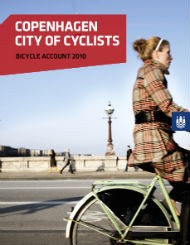
Advantages and disadvantages
A cost-benefit analysis often forms the basis for political decision making prior to traffic investments. Cost-benefit analyses involve assigning a monetary value to the advantages and disadvantages of a construction project. This makes it possible to weigh the benefits (e.g. reduced travel times and reduced pollution) against the disadvantages (e.g. construction costs and noise).
Cycle projects
The Danish Ministry of Transport has a manual for calculating cost-benefit. However, the manual does not include a method for assessing cycle projects. This is hardly viable when over one third of the population of the nation’s capital arrive at their place of work or education by bicycle. The City of Copenhagen has therefore had a cycling assessment procedure devised based on the principles set forth in the manual. The City of Copenhagen will use the procedure when assessing coming major cycle projects. In addition key cycling figures have been made available to the Ministry of Transport. This is the first step towards developing a method for cycle project analysis to be used in the Ministry’s existent cost-benefit manual.
Sound investments
The new method has so far been tested at two concrete cycle projects in the City of Copenhagen: Bryggebroen, a cyclist/pedestrian bridge across the harbour, and the reconstruction of the Gyldenløvesgade/ Søgade intersection. In both cases the conclusion is clear: From a cost-benefit point of view the investments are particularly sound, giving an equivalent or better rate of return than current road construction projects such as the widening of the motorway around Roskilde or a new motorway near Silkeborg.
Cycling figures in hard cash
>When a person chooses to cycle this is a clear gain for society of DKK 1.22 per cycled kilometre. Conversely, society suffers a net loss of DKK 0.69 per kilometre driven by car. In cost-benefit terms the health and life expectancy benefits of cycling are seven times greater than the accident costs. The cost of a bicycle is 33 øre per cycled kilometre covering purchase price and maintenance. The equivalent cost for a car is DKK 2.20 per driven kilometre.
From City of Copenhagen
